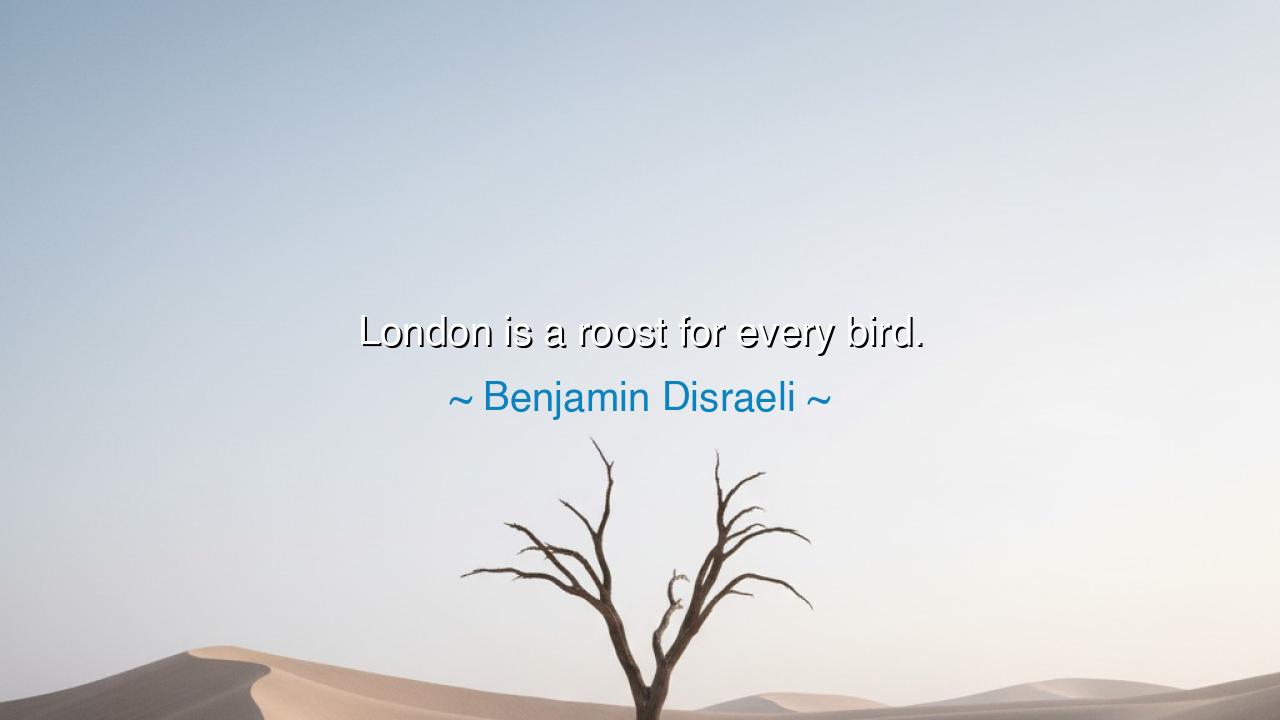
London is a roost for every bird.






Hear the stirring words of Benjamin Disraeli: “London is a roost for every bird.” Though short, this saying unfolds like a banner in the wind, proclaiming the nature of a city that became the heart of empire, the gathering-place of multitudes, the meeting point of countless destinies. To call London a roost is to acknowledge it as a perch where creatures from every land come to rest, to seek fortune, to build life, or simply to survive. And to call these creatures birds is to see men and women as wanderers, fliers of distant skies, who come to nest for a time in that great city before flying again.
Disraeli, himself both a man of power and of heritage marked as different, knew what it was to see London as such a roost. In the nineteenth century, as Britain’s empire stretched across seas, London became the magnet of the world—traders, exiles, poets, laborers, merchants, adventurers, and beggars alike. Some came seeking wealth, others refuge; some carried knowledge, others desperation. In its streets mingled the tongues of many nations, the smells of many kitchens, the colors of many garbs. The city became not one culture, but a constellation of them.
The metaphor of the bird is apt. For birds migrate, drawn by instinct, weather, and need. They alight where food is plentiful, where shelter can be found, where opportunity lies. London, in Disraeli’s age, was such a place: a hub of commerce and empire, promising abundance to those daring enough to stretch their wings. But a roost is also crowded, noisy, restless. The birds that gather are not always in harmony. There is competition, struggle, and often conflict. Yet still they gather, for the roost provides what no other place can.
History gives us clear images of this truth. Think of the Irish immigrants who fled famine in the mid-1800s and filled London’s poorer districts with their labor and their grief. Think of the Jewish communities, including Disraeli’s own ancestry, who sought shelter from persecution and found both hardship and opportunity in the city. Think of the Indian merchants, the African seamen, the Caribbean workers, all who came in the tides of empire. London became the roost of the world—vast, diverse, and turbulent.
But this truth is not London’s alone. Many great cities of history were such roosts: Rome, where citizens, slaves, and foreigners mingled in the streets of empire; Constantinople, where East met West in a swirl of languages and faiths; Alexandria, where scholars from across the known world studied under one roof. Each was a roost for every bird, gathering life from across the earth, thriving by diversity, tested by its tensions. Disraeli’s words stand as both description and warning, for such cities can be glorious, but also fragile, held together by the delicate balance of so many wings.
The lesson for us is clear: greatness is not found in isolation, but in openness. A roost may be noisy, messy, even dangerous, but it is alive. To fear the presence of other birds is to deny the strength that comes from diversity. But to ignore the challenges of the roost is folly as well—it requires care, wisdom, and patience to make such a gathering place thrive. The wise see both: the opportunity and the burden of living in the midst of multitudes.
Practically, this means: when you live in a great city—or in any diverse community—do not close your heart. Understand that you are but one bird among many, sharing the same branches, the same sky. Learn the songs of others, respect the space of others, and contribute your own voice to the harmony. But also accept the struggle: in crowded places there will be friction, yet out of that friction arises strength, resilience, and possibility.
Therefore, O seekers of wisdom, let Disraeli’s words be your guide. London—and every great city after it—remains a roost for every bird, a place where wings from every horizon meet. Do not despise the crowd, for in it lies life; do not fear the noise, for in it lies energy; do not cling only to your own perch, but look upon the many. For the city, like the roost, is the forge of destiny, where the flight of nations comes together under one sky.






AAdministratorAdministrator
Welcome, honored guests. Please leave a comment, we will respond soon